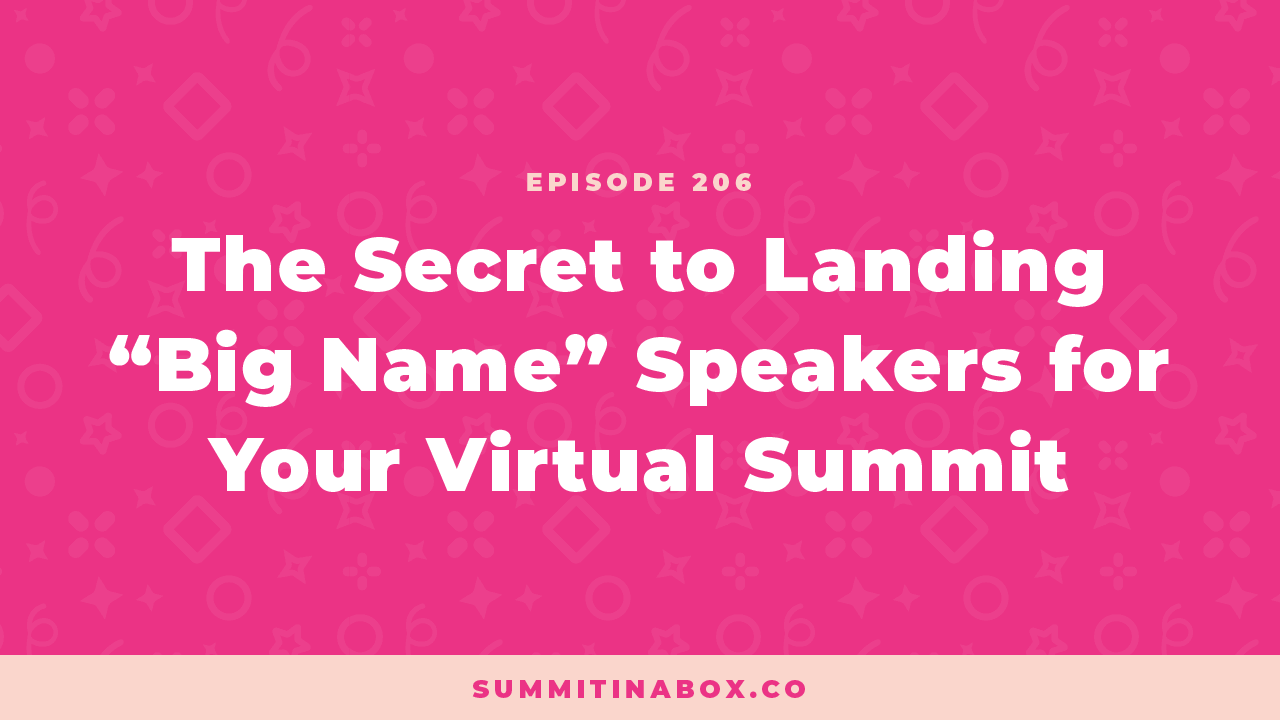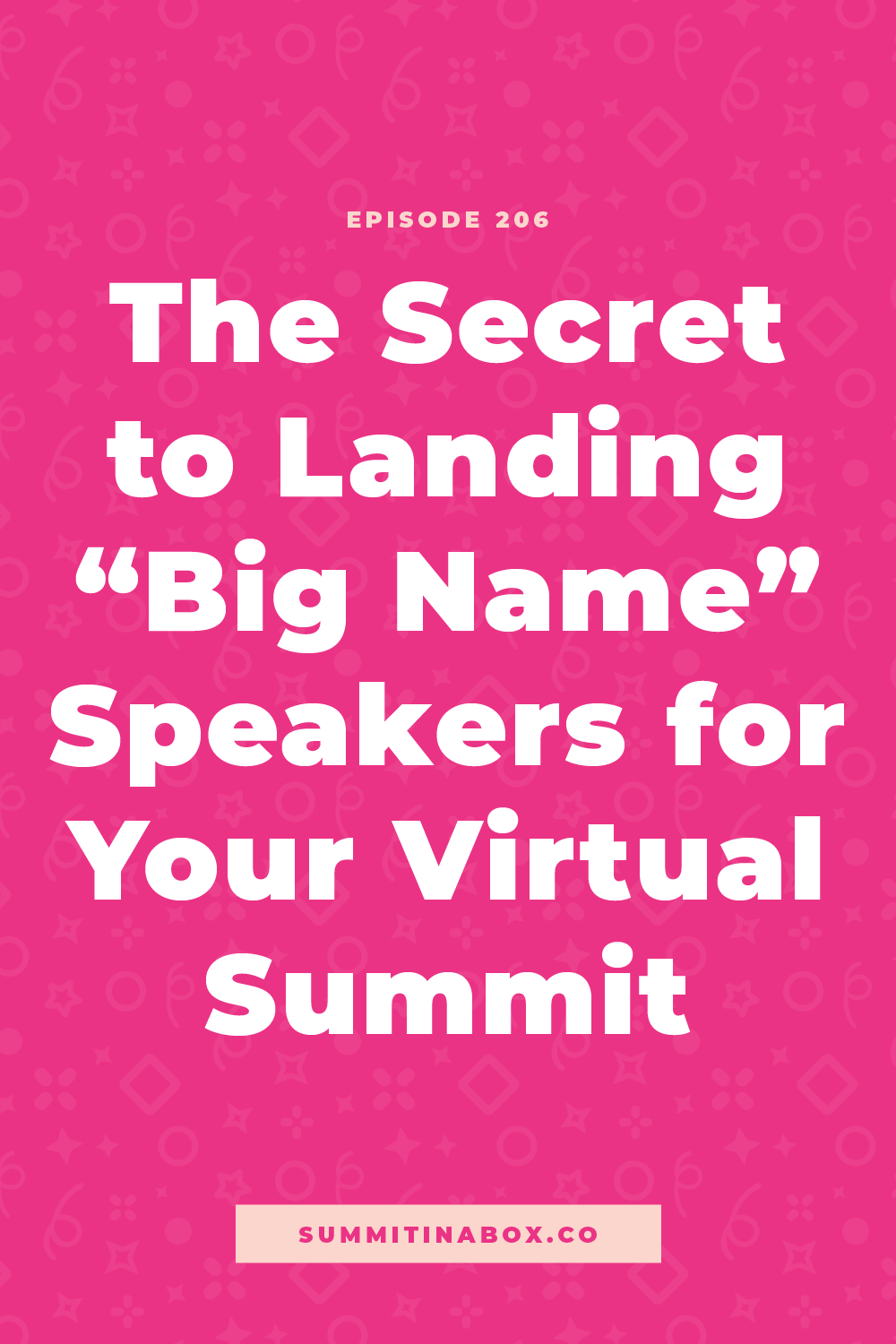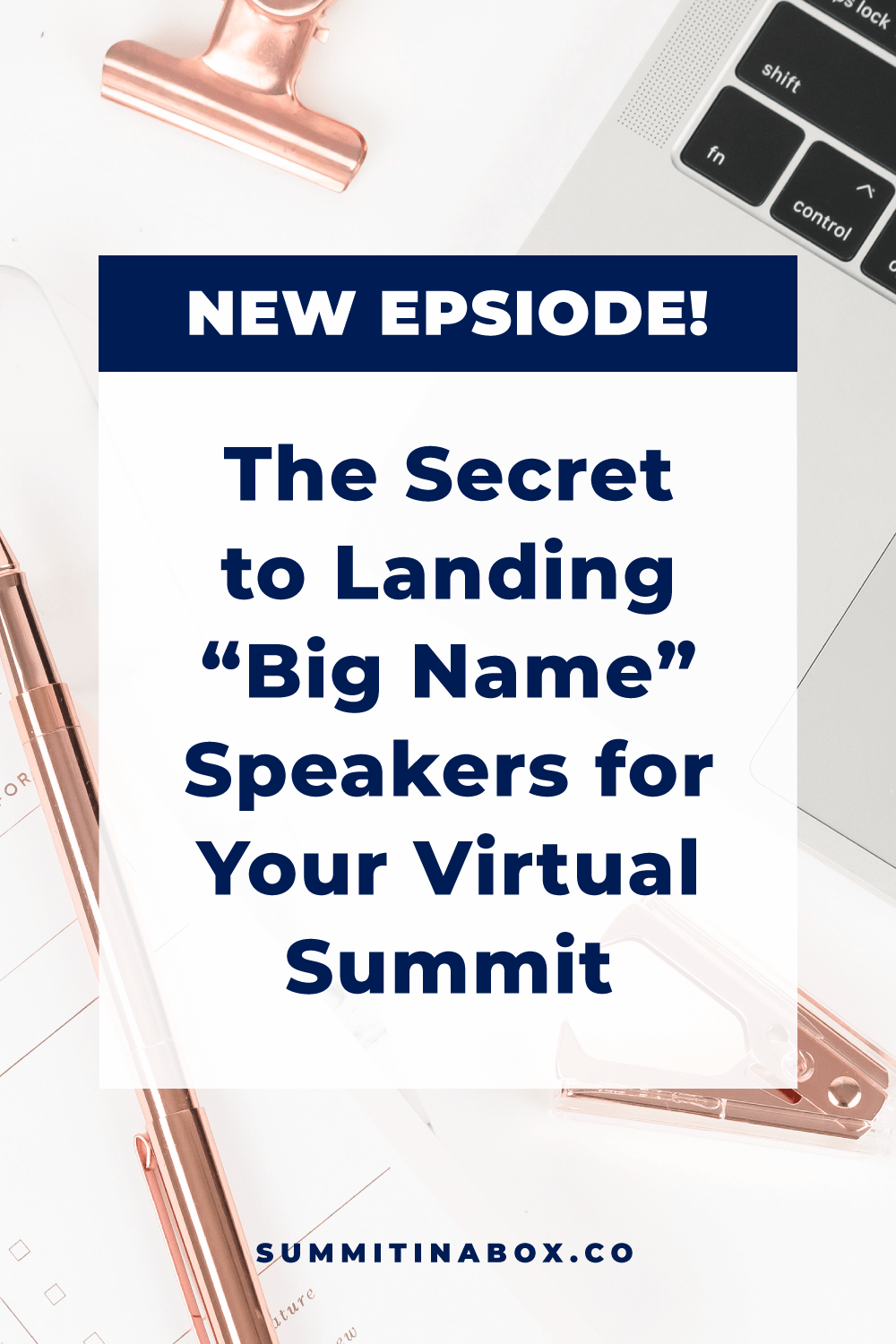The Secret to Landing "Big Name" Speakers for Your Virtual Summit


Have you ever felt like you’re not a big enough deal to land the speakers you dream of having in your summit lineup?
Pitching speakers is one of the biggest things I see holding people back from moving forward with their summits. The fear of getting rejected and hearing nothing but “no” when you start sending pitches is very common. And if you’re thinking about pitching speakers that feel a little out of your league, those fears just get amplified.
We’ve talked several times on the podcast about the process of pitching speakers, and what makes a speaker more likely to say yes, but today I want to focus on what goes into getting those more well-known speakers to agree to your summit. I’ll also get into why, surprisingly, landing “big names” may not be the ticket to summit success that you think it is!
Everything I share in this episode is based on my experience working with some pretty “big name” speakers for my most recent summit back in December, and also our experience working with a pretty “big name” host over the last few months. I’m excited to dive in and share the behind-the-scenes with you today!
In this episode, we’ll cover:
- Whether or not it’s worth it to pitch “big name” speakers
- Why you should probably change the way you’re thinking these speakers
- What people think the secret is to landing well-known speakers (that actually doesn’t matter at all!)
- What really gets those sought-after speakers to say yes to your event
- And more!
Listen to the episode
Download the episode transcript here.
“Big Names” aren’t all they’re cracked up to be
Let's start by setting the record straight on why you might need to change the way you're looking at the “big name” speakers you’re thinking about pitching. It’s important to remember that these people you might be putting on a pedestal are just people.
It is easy to get in the mindset of seeing successful business owners as celebrities, and letting your subconscious mind tell you that they're more important or better than you because of it.
The truth is that these people aren’t better or more important than anyone else. They might have more commitments, they might be pickier about what they say yes to because they need to get bigger results, and they might be stricter about their boundaries, but they're just normal business owners like you and I!
With that in mind, let’s talk about one of the major reasons I’ve found that a high-profile speaker doesn’t always translate into high-profile results for your event:
A big audience doesn’t matter if they don’t promote
An important thing to keep in mind is that “big name” speakers are actually less likely to promote your event and bring results to your summit. Most of the time, this isn’t because they think they’re too good to promote your event, but they just have more commitments and boundaries they need to be mindful of.
For example, earlier in my business, I used to send as many solo emails as was recommended when I was part of a summit or a bundle. It didn't really matter to me what the requirement was. A lot of times I didn't have my own stuff going on, so I had no problem sending out three or more emails. These days, I am way pickier, and I am upfront about it when I'm pitched for opportunities.
I don't want to bombard my audience with summits and bundles in a way that makes them tune out or unsubscribe to what I'm working very, very hard to do. And I'm careful around how much I'm pitching or promoting to leave room for my own offers. I'm never almost never going to send more than one email about something because I have my own stuff going on. I worked very hard for the email list I built.
In my experience, the speakers who have a lot going on in their business think about promoting in a very similar way. It's not that they're too good to promote, but they just tend to be pickier about what they send to their list.
I know some summit hosts have the mindset that they don't care if the “big name” speakers in their lineup don't promote because they just want their face on the registration page, but that’s only going to get you so far. One of the reasons summits work so well is that you’re bringing together all of the speaker’s audiences in a way that benefits everyone. But if your speakers don’t promote, it doesn’t do you much good.
Now that this disclaimer about “big-name” speakers is out of the way, let’s get into what it takes to land this type of speaker for your event!
What you DON'T need to land “Big Names” speakers
Whether you’ve thought about it consciously or not, most summit hosts have the assumption that in order to land “big name” speakers, you also need to be a “big name” in your industry. Maybe you've thought that you’re not a big enough deal to land those high-profile speakers, but I’ve seen firsthand recently that this is definitely not the case!
For example, we’re involved in a summit right now hosted by someone who is, by all accounts, a very big deal. Multiple seven-figure companies, check. Blue checkmark on Instagram, check. Over a million email subscribers, check. This person is definitely a “big name” as far as online business owners go, but you would not believe the struggle they’ve had landing speakers for their event.
I never would have imagined the amount of follow-up that has had to happen, the number of calls that would be involved to convince people, and how many no responses there have been. Usually, when I pitch speakers for a summit, I might get up to 3 no’s. But for this summit with a high-profile host, it’s taken over 80 pitches just to get 20 yeses so far.
I share this because I want you to know that if you're doubting yourself because of the size of your following, or the success you've had in business, please relieve some of that pressure from yourself. The size of your audience or how big of a deal you are is not what matters when it comes to landing speakers.
The true key to landing speakers: Relationships
The true key to landing “big name” speakers (or any speakers for that matter!) is relationships. I know you might hear that and want to just immediately tune out or roll your eyes, but look back at those stats I just shared above!
I, little old Krista, pitched some very well-known business owners for our last summit, who are extremely picky about what they say yes to and I only got one no, because that person was launching at the same time as my summit.
On the other hand, the person with a blue checkmark has gotten 60 no’s or no responses so far. The difference is that I've been building relationships for years, and this person is hosting a summit for a newer brand in an industry where she hasn't built any relationships in the niche.
Both of the events in these examples are very well positioned, and the speakers we’re pitching have the perfect audiences for both of these events, but I have relationships and this other person doesn't. Relationships have made a world of difference.
Landing my "Big Name" speaker
When we started planning the latest edition of Sell with a Summit that we hosted in December we decided to go for some more well-known people in this space. I understand that these speakers tend not to promote as much, but since we've got a proven success record with our summits, and we have a bigger audience now, I felt comfortable putting strict requirements on our speakers to promote.
I set expectations about promotion requirements from the beginning, literally in my pitch emails, that we only want them to say yes if they're willing to promote. Honestly, I thought the promotion requirement would be a major reason these “big name” speakers wouldn't be interested, and had very low expectations going in.
I remember telling my team that I expected at least half of these potential speakers to say no, but I went in with a positive attitude and low expectations, thinking I’d be thrilled if any of these speakers said yes.
In the end, only ONE of those “big-name” speakers I pitched said no, and it was because she had a launch going on at the same time. And we decided on another way to collaborate instead!
Everyone else got back to me right away, said yes, and had no problem with the promo requirement. I have zero doubt that the reason I got such a positive response was because of the relationships I’ve built with these people over the years.
How to build relationships with potential speakers
For me, building relationships has happened pretty organically over the years. It has always come really naturally to me to support other people.
When I see someone doing something awesome, I share it or I tell them that I think it's awesome, and often I end up investing in what they’re doing. I’ve paid for coaching, group programs, and courses from a ton of the speakers I pitched because they're doing awesome things that I truly believe in. I have friends in my mastermind tease me that they see my face on every single sales page they look at as a testimonial, because that’s just how I am. This isn’t something that I’ve done strategically, but it is something you could pay closer attention to.
I haven’t intentionally gone around identifying people I might want to collaborate with in the future and trying to become friends with them. But if it doesn’t come naturally to you, I honestly don’t think it’s a bad thing to be strategic and intentional about getting closer to the leaders in your industry.
Think about the people and people and businesses you invest in and ask yourself how you can make the most of the opportunity to connect with this person more closely.
Building relationships that turn into collaborations with the people you learn from and invest in will be more doable for some than others, depending on your niche and industry, but it’s definitely worth keeping in mind!
If you're not someone who naturally builds relationships, the best thing you can do is to start being intentional about it, and I have a few resources that will help!
- Michelle Warner's Networking That Pays course is amazing. I've gone through it and it has helped me so much. She also came on the podcast and shared more about her networking strategy!
- Jordan Gill at Systems Saved Me also has a Revenue Rolodex Training that is pure gold. It's positioned as helping service-based business owners get referrals, but it is so good for building relationships with potential speakers too.
Remember: the “Big Name” speakers are just people
Before you send your next speaker pitch, stop for a minute and consider how you make your decisions about what you participate in.
If you were pitched for two very similar summits, one hosted by someone you know, and one hosted by someone you've never heard of, which one are you more likely to say yes to? Which one are you going to want to promote more? Obviously, you’re going to be more excited about the one with a relationship, right?
As I've gotten pickier about what I say yes to over the last couple years, relationships are one of the biggest factors in my decision. I'm always going to look at positioning and consider how well the event is put together and whether it’s an audience I want to be in front of, no matter what. But if it’s well positioned, whether or not I know the person sending the pitch has a big part to play in the way I go about deciding from there.
If I know the person, I go in wanting to say yes. Unless there’s a major reason that I have to say no because the dates don’t work or something like that, I’m very likely to say yes to a pitch from someone I have a relationship with.
If I don't know the person, I go in looking for a reason to say yes, but I need to be convinced. I lean towards no as a default, but then read their pitch looking for something to convince me to say yes.
This isn’t because I’m evil or that I think I’m too big of a deal, but because we can only commit to making so many presentations or promoting so many things. I have to be picky about what I say yes to, and that's the way other people you pitch for your event will look at it as well.
That definitely doesn't mean I never say yes to someone I don't know. In fact, over the past couple of months, I've been in bundles hosted by people I didn't know and I'm so glad I know those people now. So when I’m able to, I do say yes to cold pitches if it looks like a good fit, but my approach to making the decision is very different.
Resources
- Michelle Warner's Networking That Pays course
- Revenue Rolodex Training from Jordan Gill of Systems Saved Me
- Summit Speaker Resources and Blog Posts
- Episode 17: How To Connect With Potential Speakers
- Episode 20: How to Pitch Virtual Summit Speakers And Hear "Yes" More Than "No"
- Episode 24: My Story of Self-Doubt Leading Up To My First Summit
- Episode 99: 4 Reasons Speakers Say "Yes" When You Pitch Them for Your Virtual Summit
- Episode 111: 4 Mistakes to Avoid When Pitching Virtual Summit Speakers
- Episode 125: Your Speakers' Role in Promotion and Pressuring Them to Promote
- Episode 135: How to Make it EASY for Speakers to Promote Your Virtual Summit
- Episode 158: How to Make Non-Transactional, Ick-Free Speaker Connections with Michelle Warner
- Episode 191: Build On Your Speaker Relationships After a Virtual Summit without Burning Out with Amelia Roberts
- Summit Host Hangout Facebook group
- Launch with a Summit Accelerator
- 6-Figure Summits Workshop Bundle
Pin it for later!




